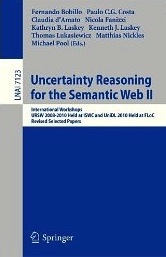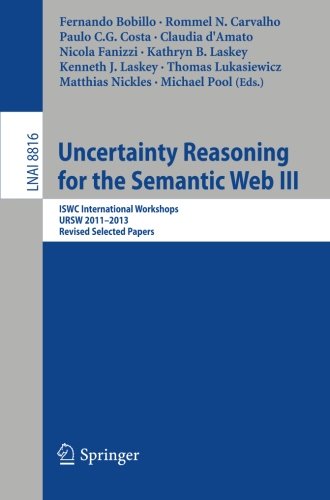Research Interests
The major area of my research is on the use of Bayesian probabilistic reasoning as a means to achieve better information technology systems, with a special focus on decision support and multi-source data fusion. As a result, I am interested on the diverse areas of knowledge that contribute to this broad challenge (e.g. Data Mining, Utility theory, Markov processes, Game theory, etc), while also flirting with the different domains in which I believe Bayesian reasoning can make a difference (e.g. BioGenetics, C3I systems, Web applications, etc). At present time, I am working on or interested in:
- Representing and reasoning under uncertainty in the Semantic Web.
- Exploring the mathematical aspects of different uncertainty reasoning techniques.
- Employing Multi-Entity Bayesian Networks to multi-sensor data fusion architectures for behavioral assessment, command and control systems, and similar applications.
- Application of Semantic Technologies and AI techniques in context-driven decision problems.
- Application of simulation, decision theory and probabilistic reasoning to complex problems.
- Development of cyber-security techniques, with especial focus on software-defined radios and cognitive radio applications.
Major Projects in which I have some degree of participation
ETURWG
The Evaluation of Technologies for Uncertainty Reasoning Working Group (ETURWG) is an official working group of the International Society for Information Fusion (ISIF), which was formalized in July 2011. The group provides a forum for its members to collectively address a common need for the ISIF community, coordinate with researchers in the area, and evaluate techniques for assessing, managing, and reducing uncertainty. The main aspects involved are:
- To establish features required for any quantitative uncertainty representation to support the exchange of soft and hard information in a net-centric environment;
- to develop a set of use cases involving information exchange and fusion requiring reasoning and inference under uncertainty; and
- to define evaluation criteria supporting unbiased comparisons among different approaches applied to the use cases.
The goal of the ETURWG is to bring together experts, researchers, and practitioners from the Fusion community to leverage the advances and developments in the area of evaluation of uncertainty representation to address the problem of evaluating uncertainty representation and reasoning approaches for High Level Information Fusion (HLIF) systems. The group will provide a forum for its members to collectively address a common need for the ISIF community, coordinate with researchers in the area, and and evaluate techniques for assessing, managing, and reducing uncertainty.
SALOMON
The Salomon project spawned from collaboration between the GMU C4I Center and the Brazilian Institute to Air Space Control (ICEA, from its Portuguese acronym). It involves three main research thrusts encompassing the areas of cyberwarfare, artificial intelligence, operations research, and gaming and simulation:/p>
- To characterize and distinguish situational conditions for predictive analysis and impact assessment under various behaviors and environments.
- To apply simulation/emulation and gaming techniques for improving the decision-making and overall performance of air traffic controllers and supervisors in various different scenarios (e.g. day-to-day operations, under cyber attacks, etc).
- To design, implement, and evaluate cyberwarfare techniques (e.g. attacks, mitigation, etc) for key Air Control infrastructure, such as radar and ADS-B networks.
The project involves developing a common simulation/emulation environment that allows for synergistic, intertwined research of the above topics. For example, results of research on new types of attacks against an ADS-B network (cyber domain) would have its impact on an air traffic control operation systematically evaluated, while providing controllers and supervisors with a hands-on experimentation on how to perceive and react to that new attack. Impact assessment also leverages from the development of an ontology-based framework in which cyber and physical behaviors are integrated in a consolidated view, using a combination of open standards protocols and semantic technologies. This framework employs both real elements (e.g. ADS-B radios, air traffic controllers, radar feeds) with virtual ones, provides an innovative approach to addressing the difficulties in correlating cyber and physical behaviors in an integrated view, thus allowing for real-time analysis and direct application in training and evaluation.
PROGNOS
PROGNOS is the abbreviation of PRobabilistic Ontology for Naval Operations Systems. The project was supported by the Office of Naval Research (ONR) via its thrust area: Automated Information Integration (sub-area: Predictive Situation Assessment to Provide Impact Assessment). GMU team used probabilistic ontology to model various environment and situation, and is developing mathematically rigorous, computationally efficient algorithms, and tools with GUIs for predictive analysis, and situation assessment.
PR-OWL
One of the major limitations within the development efforts of the Semantic Web is the lack of a comprehensive, principled formalism for representing and reasoning under uncertainty. That is, current SW research is focused on classical logic and some of its variants, failing to provide a means to deal with the many forms in which knowledge cannot be discharged or ignored (e.g. incomplete, ambiguous, or dissonant evidence).
PR-OWL (Probabilistic OWL) is one of the approaches aimed to solve the above limitation using Bayesian methods for representing and reasoning under uncertain knowledge. The framework of PR-OWL is Multi-Entity Bayesian Networks (MEBN), a First-Order Bayesian Logic that provides the mathematical basis for merging the expressiveness of Classical First-Order Logic with the power and flexibility of Bayesian Probability.
Information on both PR-OWL and MEBN can be found on the PR-OWL website.
UnBBayes-MEBN
UnBBayes is a probabilistic network framework written in Java. It's composed by a inference engine, a GUI editor, an API, and a learning environment. The algorithms used are based on strong junction tree method and measure and search (K2 & B).
Currently I am working with the UnBBayes folks at the University of Brasilia in the development of a GUI and a reasoner for opening, creating, saving, and reasoning with probabilistic ontologies in PR-OWL format. Files saved in UnBBayes-MEBN are backward compatible with "legacy" (non-probabilistic) ontologies so it can be opened in ontology editors such as Protègè or Swoop.
URSW
The focus of the Uncertainty Reasoning for the Semantic Web workshop (URSW) is to address the challenge of representing and reasoning with incomplete, uncertain information in the context of Semantic Web development. The workshop is held at the International Semantic Web Conference (ISWC).
ISWC is a major international forum for presenting visionary research on all aspects of th Semantic Web. The Uncertainty Reasoning Workshop is an exciting opportunity fo collaboration and cross-fertilization between the uncertainty reasoning community and the Semantic Web community
The first workshop (URSW 2005) was held on the fourth ISWC, in Galway, Ireland. The second workshop (URSW 2006) was held at the fifth ISWC, in Athens, GA, USA. The third workshop (URSW2007) will be held at the sixth ISWC, in Busan, Korea.
URW3-XG Incubator Group
I am working as an invited expert in the W3C's Uncertainty Reasoning for the World Wide Web (URW3) Incubator Group, which is part of the Incubator Activity. The group's mission is to better define the challenge of reasoning with and representing uncertain information available through the World Wide Web and related WWW technologies. More information can be found in the URW3-XG Charter.
Academic Service
Current
- IEEE Transactions on Automation Science and Engineering (IEEE T-ASC – ISSN: 1545-5955)
Technical Reviewer (2013) - Nazarbayev University Review (Oak Ridge Associated Universities)
Technical Reviewer (2013) - National Science Foundation (NSF CISE/CNS Program)
Technical Reviewer (2013) - IIIE Systems and Information Engineering Design Symposium (SIEDS)
Technical Reviewer (2013) - Virginia Innovation Partnership – U.S. Department of Commerce i6 Challenge Award (US DoC – VIP)
Member of the Review Board (2012-2013) - Journal of Intelligent Information Systems (JIIS - Springer - ISSN: 0925-9902)
Technical Reviewer (2012-2013) - Information Fusion (Elsevier - ISSN: 1566-2535)
Technical Reviewer (2012-2013) - Evaluation of Technologies for Uncertainty Representation
ISIF Working Group (ISIF ETURWG) Chair (2011-2013) - ACM Computing Surveys Journal (CSUR – ACM DL - ISSN: 0360-0300)
Technical Reviewer (2011-2013) - Extended Semantic Web Conference (ESWC)
Program Committee member (2011-2013) - International Conference on Semantic Technologies for Intelligence, Defense, and Security (STIDS)
Conference Chair (2010-2013) - International Conference on Information Fusion (FUSION)
Program Committee member (2006-2013) - Association for the Advancement of Artificial Intelligence’s Conference on Artificial Intelligence (AAAI)
Program Committee member (2005-2013) - Uncertainty Reasoning for the Semantic Web Workshop (URSW)
Organizing Committee and Program Committee member (2005-2013) - International Symposium Electronic Warfare (SIGE)
Program Committee member 2003-2013
Past
- AAAI Fall Symposium on Machine Aggregation of Human Judgment
Technical Reviewer (2012) - Semantic Web Journal (SWJ – IOS Press)
Technical Reviewer (2011-2012) - IEEE International Conference on Semantic Computing (IEEE-ICSC)
Program Committee member (2011-2012) - Transactions on Systems, Man, and Cybernetics--Part A: Systems and Humans (SMC-A – IEEE Press - ISSN: 1083-4427)
Technical Reviewer (2009-2012) - International Journal of Geographical Information Science (IJGIS –Taylor & Francis Online – ISSN: 1365-8816)
Technical Reviewer (2009-2012) - National Science Foundation Review Panel: Engineering Design and Innovation proposals (NSF EDI program)
Panel Reviewer (2011) - International Semantic Web Conference (ISWC)
Program Committee member (2011) - International Workshop on Metamodels, Ontologies, Semantic Technologies (ONTOBRAS)
Program Committee member (2011) - Data & Knowledge Engineering (DKE – Elsevier - ISSN: 0169-023X)
Technical Reviewer (2008-2011) - IberoAmerican Society of Artificial Intelligence (IBERAMIA)
Program Committee member (2008, 2011) - Czech Science Foundation
Proposal Review Board Reviewer (2010) - Fourth Conference in Ontology for the Intelligence Community (OIC)
Conference Chair (2009) - Workshop on Managing Vagueness and Uncertainty in the Semantic Web (VUSW 2009)
Program Committee member (2009) - International Journal of Approximate Reasoning (IJAR – Elsevier - ISSN: 0888-613X)
Technical Reviewer (2006-2009) - Fourteenth Americas Conference on Information Systems (AMCIS 2008)
Program Committee member (2008) - First International Workshop on Fuzzy Logic On the Web (FLOW 2008)
Program Committee member (2008) - W3C Uncertainty Reasoning for the World Wide Web Incubator Group (URW3-XG)
Invited Expert (2007-2008) - Journal of Artificial Intelligence (JAIR – AAAI Press – ISSN: 1076-9757)
Technical Reviewer (2007) - Third Operational Data Link Symposium (SEDOP 3)
Chair (2007) - National Conference on Artificial Intelligence (AAAI)
Program Committee member (2006-2007) - Journal of the Brazilian Computer Society (JBCS)
Techical Reviewer (2006)



